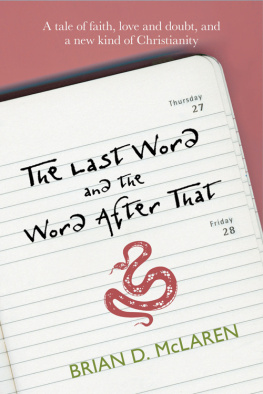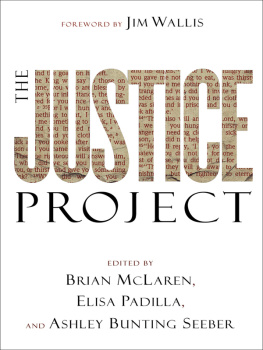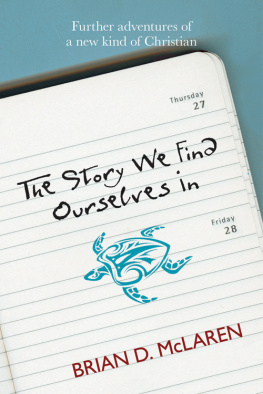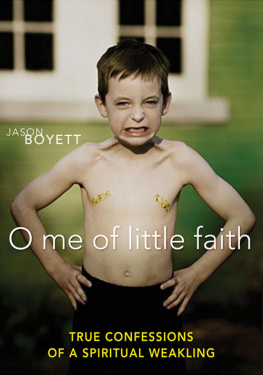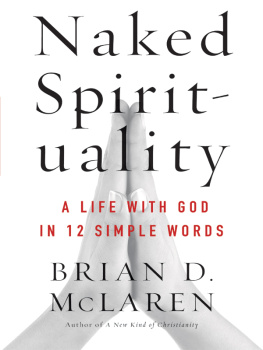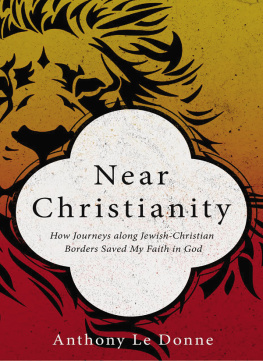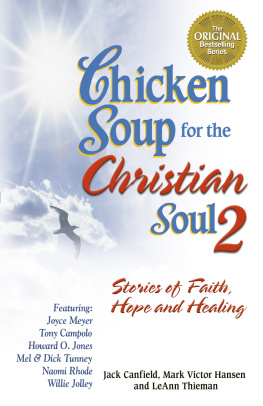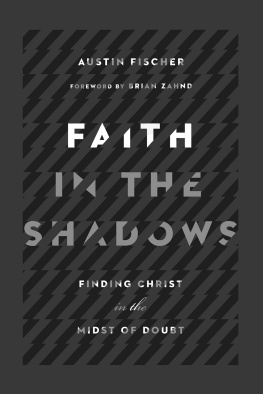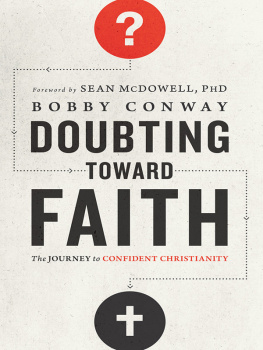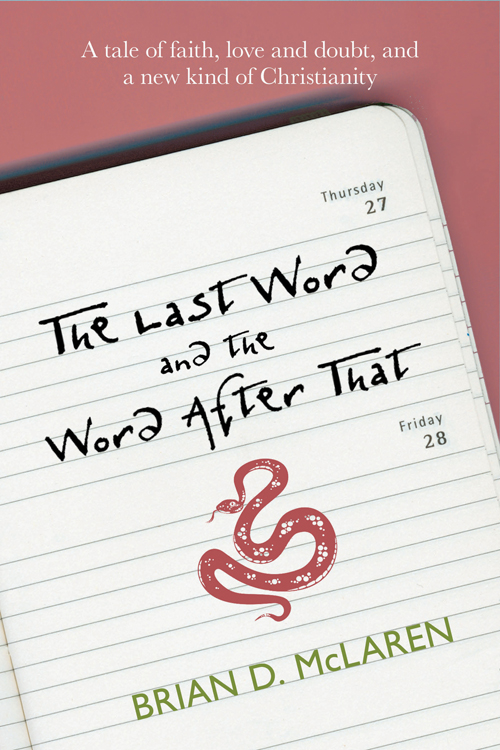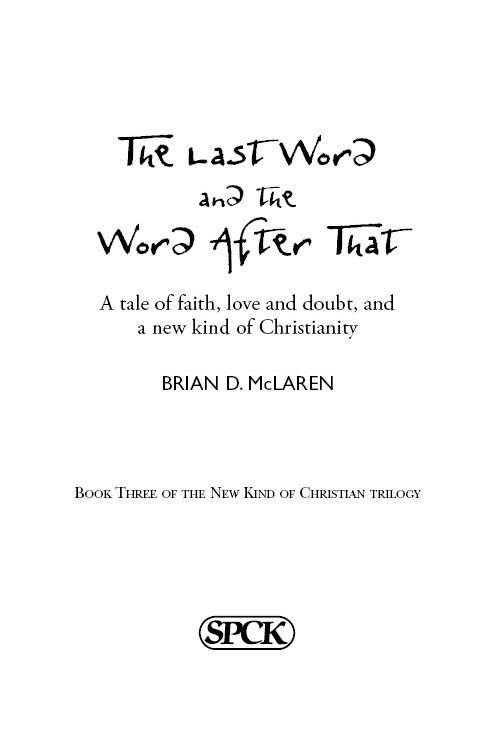First published in Great Britain in 2013
Society for Promoting Christian Knowledge
36 Causton Street
London SW1P 4ST
www.spckpublishing.co.uk
Copyright 2005, 2013 by Brian D. McLaren. All rights reserved.
AUTHORIZED REPRINT OF THE EDITION PUBLISHED
BY JOHN WILEY & SONS, INC.
No part of this book may be reproduced in any form without the written permission of John Wiley & Sons, Inc. Requests to the publisher for permission should be addressed to the Permissions Department, John Wiley & Sons, Inc., 111 River Street, Hoboken, NJ 07030, 201-748-6011, fax 201-748-6008, or online at www.wiley.com/go/permissions.
Readers should be aware that internet websites offered as citations and/or sources for further information may have changed or disappeared between the time this was written and when it is read.
SPCK does not necessarily endorse the individual views contained in its publications.
All scripture quotations, unless otherwise indicated, are taken from the HOLY BIBLE, NEW INTERNATIONAL VERSION. Copyright 1973, 1978, 1984 by International Bible Society. Used by permission of Hodder & Stoughton Publishers, a member of the Hachette UK Group. All rights reserved. NIV is a registered trademark of International Bible Society. UK trademark number 1448790.
This story is a work of fiction: all characters are creations of the author. Any resemblance to any real person, living or dead, is purely coincidental and unintended.
British Library Cataloguing-in-Publication Data
A catalogue record for this book is available from the British Library
ISBN 9780281069972
eBook ISBN 9780281069989
eBook by Graphicraft Limited, Hong Kong
CONTENTS
I ALWAYS HAVE the same question running through my mind when other authors new editions come out: What would you do differently if you were beginning the book now, knowing what you know now? Have you changed your mind on anything you wrote about? I recently re-read The Last Word and the Word After That to see how I would answer, and thankfully, although there have been a few minor winces and blushes, I havent whacked myself in the head or said, What was I thinking?
Of course I knew I was taking a risk when I wrote The Last Word and the Word After That. I remember telling my sagely editor, Sheryl Fullerton, that I wondered how many friends I would have left after the book came out. After all, you cant tinker with the conventional view of hell without having the defenders of the status quo give you heck. She assured me that Id still have at least one.
Although I didnt look forward to the controversy that this book couldnt help but generate, I dont regret taking the risk. As with its two prequels, Ive heard again and again from people how God used this book to save their faith and that they wouldnt be walking the Christian path today if it werent for coming across The Last Word . As often as not, when people tell me theyve read all three books, theyll add, The last one was my favorite.
But of the three books in the trilogy, this is the one I would do most differently if I were starting again. The difference isnt due to any holding back on my part when I wrote The Last Word, but instead it is due to the fact that Ive learned some things from other authors since the books publication that would have strengthened and augmented my argument had I known them then. For example, The Evangelical Universalist (Cascade, 2006), by Gregory MacDonald (a pseudonym, for reasons that are easily imaginable), makes many of the points I needed to create fictitious characters to articulate, and it critiques the conventional view with unmatched levels of clarity and charity.
Shortly after I submitted the manuscript for The Last Word , I received Andrew Perrimans manuscript for The Coming of the Son of Man (Paternoster, 2006. See also his new Re:Mission: Biblical Theology for a Post-Biblical Church , Paternoster, 2007, and his website, www.opensourcetheology.net). Andrew was proposing a bold new reading of key New Testament passages relating to eschatologythe future, the end of the world, heaven and hell, and so on. Around this time, I also discovered that my friend Jay Gary was thinking along similar lines (www.jaygary.com), and Jay introduced me to Tim King (www.presence.tv), another Bible scholar grappling with eschatology in fresh ways. These scholars were joining N.T. Wright, Craig Hill, and others who, although their views vary on some details, are unified in their rejection of the pop-eschatologies that dominate most of our religious communities.
So right when the Left Behind novels were breaking historic sales records, our top scholars were leaving Left Behind eschatology farther and farther behind. Together, these scholars helped me realize that in The Last Word I had indeed been on the track of something that for most people remains elusive. I can describe that elusive something in terms of a percentage. Of the apocalyptic passages in the Bible that we conventionally interpret as referring to the end of the world and hell, all of our best scholars agree that somewhere between zero and one hundred percent of them actually refer to the destruction of Jerusalem in A.D. 70. (There are few generalizations about scholars that one can make with this kind of confidence.) The question is what percentage.
The destruction of Jerusalem occurred in part because most of Jesus countrymen rejected the call to nonviolence implicit in his message of the kingdom of God. Instead, the Zealot party (with which the Pharisees had been closely aligned) launched a violent revolt against Rome in A.D. 67 by taking control of Jerusalem. For three years they held the city against Romes re-conquest, but in A.D. 70, four legions of Roman soldiers led by future-emperor Titus breached the citys walls. Whether accidentally or on purpose, Titus set fire to the Temple built by Herod the Great, and it was burned beyond repair, along with many of the residential areas of the city. So Jerusalem was recaptured, but the temple was laid waste in the process, never to be rebuilt. The Zealots fight for liberation was crushed by Roman power. (A small group of Jewish rebels held out against the Romans at Masada, but they too were crushed in A.D. 73.)
I grew up not knowing anything about A.D. 70. Maybe the version of the Protestant doctrines of sola Scripture and Scripture interprets Scripture that I inherited meant that we werent supposed to know extra-biblical history, or that post-biblical history was irrelevant to biblical interpretation. But in my lifetime, more and more biblical scholars, including many conservative Evangelical ones, have started seeing in A.D. 70 the fulfillment of at least some significant percentage of the apocalyptic passages of the New Testament.
In fact, if you were watching a needle move on an old-fashioned gauge, it would have started near zero and would now be at or above 90 percent for many scholars.
Some fulfillments were obvious and hard to refute. For example, Jesus predicted that not one stone of the temple would be left upon another (Mark 13:2). That disturbing prediction had clearly been fulfilled before the end of the first century, never mind the end of the world. With the destruction of Jerusalem, animal sacrifice also came to an end (Heb. 10:8), as did a holy city to which one needed to go to worship the living God (John 4:21). If what Jesus and the apostles were anticipating was not the end of the world but rather the end of the world as weve known it, then it turns out they were right after all to expect that this generation would not pass until all prophetic fulfillments had come (Mark 13:30).

